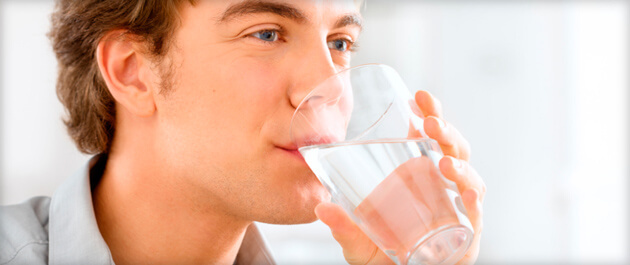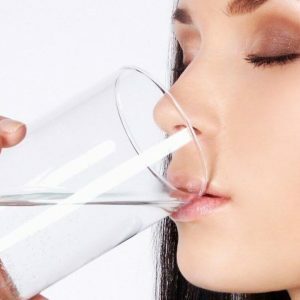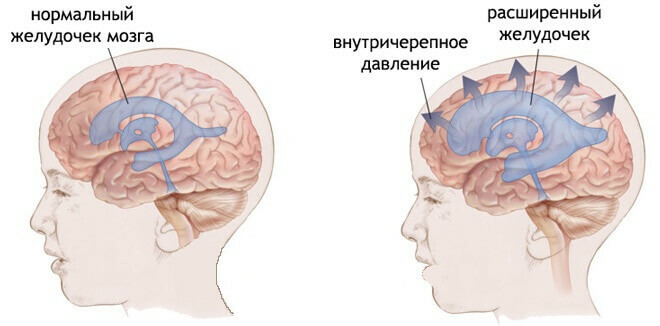Thirst: causes of development, diagnosis and treatment of concomitant pathologies

From the physiological point of view, strong thirst or polydipsia is the reaction of the body to a violation of the ratio of water and various salts contained in its tissues.A large concentration of salts in the blood plasma and tissue fluid adversely affects the osmotic pressure, which ensures the shape of cells and their normal vital activity.As a result, the elasticity of the skin is lost, facial features become sharper, a person may be bothered by headaches and dizziness.Therefore, the lack of fluid in the cells causes a very strong desire of the body to restore the water balance.
Feeling of unquenchable thirst or polydipsia decreases, or completely disappears when water is consumed in large amounts - more than two liters per day( for an adult).
Table of contents: Causes of severe thirst Diseases that may be indicated by severe thirst in combination with nausea Severe thirst and drugs Polydipsia during pregnancy Diagnosis of polydipsia Prevention and treatment of polydipsiaCauses of severe thirst
Polydipsia occurs due to intensive activation of the drinking center located in the brain.This, as a rule, can be caused by physiological or pathological causes.
For physiological reasons, causing a strong thirst, we can relate :
- Increased loss of water with sweat during intense physical exertion or heat.
- Dehydration of the body with poisoning accompanied by diarrhea.
- Intoxication of the body with the products of alcohol breakdown, for natural withdrawal( through the kidneys) which require the arrival of water in large quantities.
- Too dry air in the room, which causes the body to lose moisture.This situation usually occurs during the heating season and when air conditioners work.Solve the problem with the normalization of humidity can be using humidifiers or indoor plants that increase the level of moisture in the room.
- The use of spicy, salty or smoked food, as well as the abuse of coffee and sweet sodas.
- Consumption of water with insufficient content of mineral salts, so-called soft water.It is thanks to mineral salts that the body absorbs and retains water better.Therefore, it is desirable to choose for drinking mineral waters of chloride-sodium group with sufficient salt content.
- Consuming water with excessive salt content also adversely affects the body's water balance, as salts in excess prevent the cells from absorbing water.
- Eating food and beverages that have diuretic properties.These foods cause dehydration, and a strong desire to drink.
If the physiological causes of the appearance of polydipsia are at least temporarily excluded, but the feeling of thirst does not stop, one should immediately consult the therapist and go through all the necessary studies, since the causes of this problem can be pathological.

The pathological causes of polydipsia include :
- Development of diabetes mellitus, which at first always accompanied by frequent and abundant release of urine, which in turn dehydrates the body and causes thirst.The following accompanying symptoms may also indicate the development of this disease: itching, dizziness, intermittent headaches, severe weight gain.
- Diabetes mellitus is a disruption of the endocrine system, which is accompanied by an intensive excretion of water through the kidneys( several liters of urine of light color per day).With this problem, you should consult an endocrinologist.The main causes that cause the development of diabetes insipidus are neurosurgical interventions or brain trauma.
- Hyperparathyroidism is a disruption of the parathyroid gland, in which calcium is washed out of the bone tissue.And since calcium is osmotically active, it "takes" water with it.Other symptoms may indicate the development of this endocrine disease:
- urine white;
- sharp weight loss;
- muscle weakness;
- increased fatigue;
- pain in the legs;
- early tooth loss.
- Kidney disease, which is usually accompanied by swelling, dry mouth, problematic urination .Patients with kidneys are not able to keep in the body the volumes of water necessary for its full-scale vital activity.Most often the kidneys suffer from such disorders as acute and chronic pyelonephritis, primary and secondary wrinkled kidney, glomerulonephritis, hydronephrosis and chronic renal failure.
- Chronic stress and nervous overstrain, as well as more serious mental disorders ( obsessive states, schizophrenia).Mental problems can provoke a violation of the work of the center of thirst regulation, which is in the hypothalamus.According to statistics, with this cause of strong thirst most often encounter women.Typically, the development of mental disorders can indicate simultaneously with the unquenchable desire to drink and symptoms such as drowsiness, tearfulness and irritability.
- Brain tumor, stroke and other focal lesions and brain injuries , which can disrupt the hypothalamus, responsible for the central regulation of thirst.
- Pathological problems with the gastrointestinal tract( GI tract) of , accompanied by persistent latent bleeding, which often causes a thirst.Most often polydipsia is caused by a tumor of the intestine, hemorrhoids, etc. To diagnose the presence of latent bleeding, in the first place, you need to pass an analysis of feces.
- Generalized hyperhidrosis is a strengthened sweating of a pathological nature.This disorder may indicate the development of such diseases as:
- thyrotoxicosis;
- acromegaly;
- pathological climax;
- Hodgkin's lymphoma;
- other endocrine system disorders.
Intensive non-physiological sweating is the reason for the visit to the endocrinologist.
Diseases that may be indicated by the presence of severe thirst in combination with nausea
Most often, these symptoms are combined with :
- food poisoning;
- intestinal infections;
- overeating;
- errors in the diet.
In addition, the combination of polydipsia and nausea can indicate diseases that develop other associated symptoms when developing:
- Plaque white in the tongue, belching, heartburn, dryness and bitterness in the mouth may indicate a violation of the gallbladder( cholecystitis, pancreatitis or gastritis).The same symptoms may occur during the administration of certain antibiotics and antihistamines.
- Burning of gums and tongue, metallic taste in the mouth in combination with nausea and thirst can bother with inflammation of the gums.
- Heartburn, a feeling of overcrowding and pain in the area of the stomach can indicate the development of gastritis of the stomach.
- Violation of the body's water balance and dry mouth, bitterness, plaque in the language of white or yellow indicate a violation of the thyroid gland.
- Nausea, polydipsia in combination with other painful symptoms in the gastrointestinal tract can talk about the development of CNS diseases( psychosis, neurosis, amenorrhea, neurotic disorders).
It is important to understand that if thirst and nausea bother you for several days - you can not cope without medical assistance. You should consult a doctor who will professionally evaluate the comorbid symptoms;Hand over all the necessary tests and undergo a series of diagnostic studies.All these activities will help determine which pathology you are suffering from.

Strong thirst and medicines
It should be noted that polydipsia can be caused by taking medications that help to remove moisture from the body.These can be:
- antibiotics;
- antihistamines;
- diuretics and drugs for weight loss;
- antihypertensive;
- expectorant.
In addition, some medications can cause increased sweating and thirst( eg, acetylsalicylic acid), which is usually indicated in the list of their side effects.
Among the popular drugs that are thirsty in many patients, mention may be made of Metformin, an anti-diabetic drug used in the treatment of:
- Diabetes mellitus type 1 and type 2.
- Impaired glucose tolerance.
- Gynecological diseases.
- Endocrinological disorders.
This preparation is also used to normalize body weight, because its active substance reduces insulin production, significantly reducing appetite.During the use of Metformin should follow a carbohydrate diet, otherwise there may be side effects from the gastrointestinal tract - nausea, vomiting, liquid stool, metallic taste in the mouth.
It is important to understand that with a competent approach to the use of Metformin in compliance with all the recommendations specified in the instructions for this drug, any side effects are excluded, including dehydration and thirst.
Polydipsia during pregnancy
As is known, the human body is 80% water, the sufficient presence of which in each cell, guarantees the normal functioning of the whole organism.During pregnancy, every woman is exposed to increased stress and testing.Very often the organism of the future mother suffers from thirst and water balance disturbance, which can provoke slowing of metabolic processes, and lead to pathological changes in the body of the mother and the development of the fetus.
The main causes of severe thirst in pregnant women:
-
 Formation of amniotic fluid .With each week of fetal development, the amount of amniotic fluid increases, which means that the amount of water required increases, and accordingly, polydipsia increases.
Formation of amniotic fluid .With each week of fetal development, the amount of amniotic fluid increases, which means that the amount of water required increases, and accordingly, polydipsia increases. - During the first trimester of pregnancy, a woman needs more fluid to remove toxins and toxins, because the undeveloped organs of the fetus are not yet able to neutralize them.
- Changes in the structure of the circulatory system , which occur up to the 20th week of gestation.Since the body of a pregnant woman has to work more intensively, there is an increased need for a liquid, the lack of which leads to the fact that the blood thickens.With a thick consistency of blood, the risk of blood clots, ischemia and other pathologies of the cardiovascular system increases.
- Changes in food flavors .Since during pregnancy, a woman, as a rule, abuses sweet, salty, sharp or fat dishes, she needs more liquid, which helps to digest and remove excess salts from the body.
- Bacterial and viral infections of , intestinal and respiratory disorders can also cause polydipsia.
- Gestational diabetes mellitus , the development of which is accompanied by thirst and dry mouth.Identify this disease can be using urine and feces.
It is worth noting that there are situations where, according to urinalysis and concomitant symptoms, a pregnant woman needs to reduce the amount of fluid consumed.Otherwise, gestosis may develop and the risk of premature birth increases.
Diagnosis of polydipsia
Since polydipsia can be a symptom of a serious enough pathology of any body system, the diagnosis of thirst is a very complex and lengthy process that includes:
- a patient interview;
- inspection;
- delivery of laboratory tests.As a rule, first the blood and urine are analyzed.If the cause of increased thirst is not established, then tests for hormones, hepatic and renal tests are prescribed;
- hardware examination of individual organs of the patient( lung radiography, ECG, ultrasound, etc.).
Please note! If the thirst is of a non-physiological nature, then the body, in most cases, is first diagnosed for sugar or diabetes insipidus, as well as for disorders in the functioning of the kidneys or the cardiovascular system, since such problems are most often encountered in patients.
Prevention and treatment of polydipsia
The main task of prevention and treatment of increased thirst is to restore the water-salt balance, as well as identify and eliminate factors that cause malaise.
In case of increased polydipsia, it is recommended:
-
 Increase the volume of liquid to be drunk to two liters per day .To the problem of increased thirst does not make itself felt for a long time, it is advisable to drink half a cup of purified water every hour.
Increase the volume of liquid to be drunk to two liters per day .To the problem of increased thirst does not make itself felt for a long time, it is advisable to drink half a cup of purified water every hour. - Normalize the humidity in the room , where you are, as thirst increases with dry air.To increase the humidity, you can start house plants or purchase an air humidifier.
- Abandon the consumption of fatty, spicy and salty foods of , various dietary supplements and drugs that cause thirst, as well as snacks, coffee, alcoholic drinks, sweet soda.
- Get rid of bad habits of ( smoking).
- Half an hour before starting workouts or other physical activity, drink half a glass of water.
- Monitor the quality of your urination .If urine is too light or dark, you need to reconsider the amount of fluid consumed.With a normal water content in the body, the urine is moderately yellow without a pungent odor.
If the physiological factors causing thirst are completely eliminated, but dehydration does not stop, you should immediately go to a therapist or endocrinologist at your place of residence who will prescribe all the necessary tests and conduct a thorough examination of the body of .In case there is a head injury, after which the increased thirst began to be observed, it is necessary to consult a traumatologist and a neurologist.
It is important to understand that an increased sense of thirst is not a cause, but a symptom of some ailment.And that it is quite possible we can talk about very serious diseases.Therefore, the appearance of polydipsia should not be ignored in any case.
Evtushenko Oleg, endocrinologist



